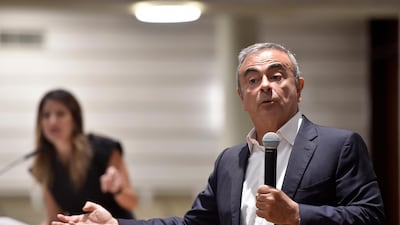Former Nissan and Renault head turned fugitive Carlos Ghosn wants to serve the interests of his debt-ridden home country Lebanon by collaborating with a new $20,000 three-month business programme at a local university, he said in a rare public appearance on Tuesday.
The move has grabbed the former executive headlines, but experts say that the impact of the unusual initiative could be limited.
“The objective is…serving the country and the society, because if today there is one specific thing that Lebanon needs, it is to create jobs,” explained Mr Ghosn during a press conference on Tuesday at the Université Saint-Esprit de Kaslik (USEK) near Beirut as he presented three new business programmes.
Costing $20,000, the main three-month “Business strategies and performance programme” due to start in March 2021 is aimed at executives from Lebanon and the region and will include a one-on-one consultancy session with Carlos Ghosn as well as guest speakers such as Jaguar and Land Rover Chief Executive Thierry Bolloré, former Goldman Sachs vice-chairman Ken Curtis and venture capitalist Raymond Debbane. The online version of the course will cost $15,000.
This programme will subsidise two others, said USEK’s President, Father Talal Hachem: a “training and upscaling programme for local businesses” and an “investment and advisory board for start-ups”.
Lebanon is reeling from one of the biggest non-nuclear explosions in history at the Beirut port on August 4 that killed nearly 200 people and worsened its economic crisis which has pushed half the population under the poverty line.
“Carlos Ghosn is capitalising his networks and on Lebanon’s strength, which is its education system. But the limits are clear. Who in Lebanon will be able to pay for such a programme in the middle of a financial and economic meltdown?” asked Sahar Al Attar, editor-in-chief at the Lebanese economic magazine Le Commerce du Levant.
Fadi Bizri, a partner at B&Y Venture Partners, a Beirut-based international venture capital firm, said the Lebanese are increasingly shying away from entrepreneurship. “As the situation is deteriorating, more people are struggling economically and fewer people want to go into entrepreneurship and take the risk of starting a company without a source of income,” he said.
There are few reliable statistics in Lebanon, including on unemployment, but experts agree that hundreds of thousands of companies have been forced to close in the past months due to the economic crisis, compounded by the effects of the coronavirus pandemic.
It remained unclear whether the cost of the USEK programme would be in real dollars or in what has come to be known as “lollars” – dollars that are stuck in Lebanese banks and can be withdrawn in limited amounts at a rate decided by the central bank. At 3,850 Lebanese pounds to the greenback, the “lollar” rate is slightly higher than the now defunct official rate of 1500 Lebanese Pounds to the dollar but much lower than the black market rate that reached 8,300 to the dollar on Tuesday.
Paul Chucrallah, managing director of the Lebanese investment fund Berytech II, also expressed doubts about the business programme.
“Education is good and might be very useful, but the priority should be to re-open the banking system,” he said. “I’m not sure what impact Carlos Ghosn, or anyone, can have today.”
“It’s not like our companies have a little productivity gap that they need counselling on. They can’t even give proper prices or figure out how to be paid,” he continued, referring to capital controls and the devaluation of the local currency, which used to be pegged to the dollar, by about 80 per cent.
Speaking to an enraptured audience, Mr Ghosn argued that entrepreneurship was a solution to Lebanon’s problems and refused to answer multiple questions about the trial of his former American colleague Greg Kelly in Japan, which he fled in mysterious circumstances on December 30.
“This is about economy, this is about jobs, this is about entrepreneurship, to allow (Lebanese society) to take its role in the reconstruction of the country,” he said. “Money is will come. Money is not a problem. Why can’t we bring money today in Lebanon? Because of lack of trust,” continued Mr Ghosn. “It’s valid at the level of a company, at the level of a city, at the level of a country.”
Mrs Al Attar said that it was “ironic” that Mr Ghosn, who holds French, Lebanese and Brazilian passports, presents himself as a role model considering investigations into his past business practices are ongoing both in Japan and in France.
“Once again, it demonstrates the gap in the way that Carlos Ghosn is perceived in Lebanon compared to the rest of the world. Although there have been recent changes in mentalities, the Lebanese are maybe less demanding regarding business ethics,” she said.
In his opening speech, Father Hachem said of his newest teacher: “has been called Mister Fixer, they named him the magician, he was branded as Mister Cost Killer, I will allow myself - if he agrees - to name him today 'Agent of change'."


